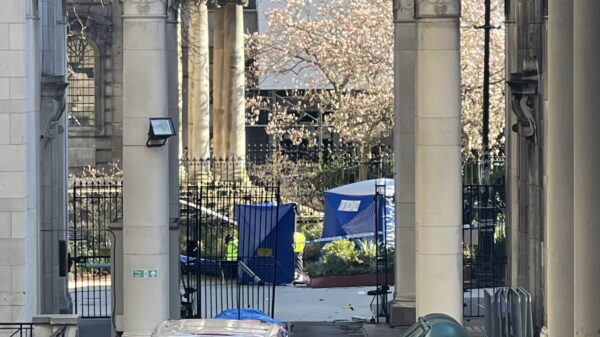On Saturday, 15 October the grassroots organisation the Land Workers’ Alliance (LWA) held their Good Food March: the aim was to vocalise the issues with our food systems, and the environmental damage caused by the reliance on large industrial farms.
The LWA was founded in 2015 as a part of La Via Campesina, an international organisation of over 200 million peasants, small-scale farmers and agricultural workers unions around the world. The LWA works for a food and land system which is accessible to all, promoting regenerative agriculture, small scale government, organic farming practices, and labour rights for land workers.
The Good Food March went through central London on Saturday, 15 October. First, people gathered in Parliament square, where handmade signs and banners were handed out along with some fruit and vegetable costumes. Two old and weathered tractors led the march, each adorned with flags and decorations. One of them had been driven from Pembrokeshire; the driver had left three days earlier and driven at 15mph to get to central London on time. Despite the long journey, driving through “the beautiful English countryside” had made the drive worth it, he said.

The crowd then proceeded up Whitehall towards Trafalgar square, following a a slow-moving truck which was carrying a DJ and sound system. At the back, a marching samba band played rhythmic drumbeats. Everybody had the opportunity to commandeer a megaph one to lead in the chants or songs. Chloe Saltmarsh, 21, was by far the most prominent vocalist. She had set up a youth collective within the LWA in 2020, and she is a leading youth activist for land and food justice. Through the megaphone, she called for environmentally friendly farming practices and protection for the rights of land workers. Away from the megaphone, in-between chants, she told me that “these issues belong to and affect everyone” and “more young people should be educated about food system issues and therefore be empowered to get involved”. This was further reiterated at a speech she gave to the protestors at the end of the march.
one to lead in the chants or songs. Chloe Saltmarsh, 21, was by far the most prominent vocalist. She had set up a youth collective within the LWA in 2020, and she is a leading youth activist for land and food justice. Through the megaphone, she called for environmentally friendly farming practices and protection for the rights of land workers. Away from the megaphone, in-between chants, she told me that “these issues belong to and affect everyone” and “more young people should be educated about food system issues and therefore be empowered to get involved”. This was further reiterated at a speech she gave to the protestors at the end of the march.
As well as demanding changes to the agricultural sector the LWA, during this cost-of-living crises, are raising demands for the government to provide access to healthy, affordable and culturally appropriate food. Speaking at the end of the march, a representative from the #RightToFood campaign highlighted the lack of access to food in the UK. 11 million people in the UK are living in food poverty, meaning to be unable to afford or have access to a healthy diet. Not having enough food is often laughed off by students as being a part of the university experience. But, this is a serious issue which permeates across the country and effects more people than you may think, including students at KCL.

There to chaperone the protest were officers from the Metropolitan Police. They appeared serious in their duties; I jokingly asked what would happen if I knocked of one officer’s hat: “you’d be charged with assault”, he replied with a smile. However, one officer was happy enough to explain their duty was only to “facilitate” and “not police the march”. Some even stood to listen to the speakers at the end. “It’s nice to hear what people are saying and what the event is about” said one officer, although they did refuse the food which had been supplied by Granville Community Kitchen.
The march culminated in a series of speeches from different grassroots organisation fighting for food and land justice. A continued theme was the failings of the government to provide access to healthy food, especially to the most vulnerable. Also prevelent were the failings to address the negative environmental and social impacts of large scale industrial. The marchers emphasised that, along with the continuing battles of other unions, the demands of working people about the inequalities in Britain need to be heard.
For more information about LWA: https://landworkersalliance.org.uk
Second year International Development
















